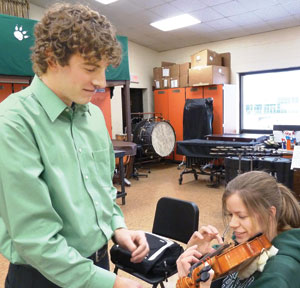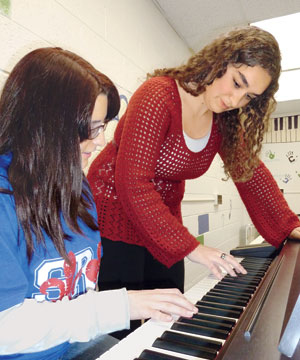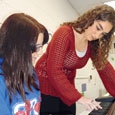Working with a student teacher is an investment in the future of the profession of music education. A cooperating teacher can influence the teaching approaches, professional demeanor, and overall attitude about the field of music education by sharing passion, knowledge, wisdom, and experience. The following suggestions can help to make the experience of being a cooperating teacher more enjoyable and more fruitful for all involved.
 Prepare the Students
Prepare the Students
In the secondary grades temptation to misbehave will be strong, so students should know that the student teacher will be enforcing the same rules that are in place already. This has to be done with caution. If you give students the impression that you don’t think they will behave, they might view it as an opportunity to see what they can get away with. It is better to remind older students of the importance of student teaching. High schools have final exams and graduation exams, and a good approach is to convey to students that this is like the big final exam for the student teacher – an opportunity to practice their teaching before they go out into the field. Creative students may consider making a welcome sign or banner to hang on the student teacher’s first day.
Prepare the Classroom
Set up a space in the rehearsal room for the student teacher. Even a simple table and chair or student desk that is designated just for the student teacher is a welcoming gesture. Include basic office supplies, and gather class schedules, curriculum guides, teacher manuals, music scores, method books, and district policies for the student teacher prior to his arrival. Seating charts are especially helpful for a nervous beginning teacher struggling to get to know many students at once. Another commonly overlooked reference for student teachers is procedures for lockdowns, fire drills, and tornado drills. If there a computer available for the student teacher to use, be certain compatability and internet permissions, including access codes, are taken care of. If there is a code for making photocopies, the student teacher will need that as well.
Prepare the Student Teacher
Give the student teacher all upcoming calendar dates, including after-school rehearsals, meetings, concerts, and field trips. It is best for student teachers to tag along to as many of your responsibilities as possible. Avoid excusing student teachers from meetings that might seem boring or irrelevant. Prior experience attending meetings will help a student teacher know what to expect in his first job. When bringing a student teacher with you, be certain to introduce him and help him feel welcome.
Make sure the student teacher understands whether he should use the material you provide for lessons or if you would like him to create his own lessons using what you have given him as a guide. If you intend for your student teacher to conduct a selection at an upcoming concert, it is never too soon to provide the score. If there are students who require accommodations or modifications to lessons, the student teacher should have this information early as well.
Lesson Plans and Discipline
Require your student teacher to turn in lesson plans. Be sure to share your lesson plan format with the student teacher, but also be aware that the student teacher may have a required format from the university. Even if the student teacher is not required to submit formal lesson plans back to the university, you should still require full lesson plans from your student teacher so he can develop the ability to think through the lesson in its entirety, including procedures, accommodations and modifications, and assessment.
Inexperienced teachers struggle with the pace of rehearsals; they may finish early and not know what to do. Encourage student teachers to plan a main lesson but have some side activities prepared. The aim of such activities should be to support the main lesson, but they should be things that can be abandoned if unneeded. The easy way out is to give students time to visit with one another or to play favorite songs with no real goal in mind other than to take up time; it is better to have worthwhile back-up material. The cooperating teacher should not always bail student teachers out, but rather inspire student teachers to see what they can do with that spare few minutes. Student teachers sometimes overplan, as well. Discuss ways to handle a rehearsal if they get bogged down.
Some universities expect students to come up with a classroom management and discipline plan. Although the student teacher should follow discipline procedures that the school uses, the advantage of writing and testing such plans early is the chance to see what works. Student teachers may see the purpose of this as simply rules to keep order, but the ideal classroom management plan is one that makes students want to do what they are supposed to. One of the more difficult lessons a student teacher will have to learn is that if students don’t care, they won’t behave. Also, it is not always possible to rely on calling parents, because if that doesn’t matter to a student then it isn’t a consequence.
Conversation between the cooperating teacher and the student teacher about classroom management is extremely important. A student teacher who takes the time to learn why the current rules are in place is better prepared for the real world.
 Observation and Teaching
Observation and Teaching
Some colleges may specify a progression from observation to full-fledged teaching, but more than likely, you and the student teacher will determine how quickly this process goes. Time spent observing in the beginning is essential, but the student teacher can become antsy with a combination of eagerness and nervousness about actually teaching.
All student teachers should observe first, even if only for a day. When I did my student teaching, my cooperating teacher’s father died the weekend before I was scheduled to start. She called me over the weekend and said, “I need you to just teach it.” While such things certainly happen, baptism by fire denies student teachers a chance to watch their mentor teach.
Other options for the first day or week include joining large ensemble rehearsals. If a percussionist is absent in the band, the student teacher can cover the part. Student teachers can also start teaching group lessons on at least their primary instrument from the first day.
As soon as possible, provide your student teacher with opportunities to teach. Early teaching experiences might include leading warm-ups, teaching small group lessons on the student teacher’s major instrument, or teaching movements to a song elementary students already know. If a student teacher is conducting a piece, he could start running through it in the first or second week.
Cooperating teachers should find appropriate tasks for their student teachers. Student teachers are going to make mistakes, but don’t set them up to fail or look incompetent in front of students. If a student teacher says percussion is his weakness, you should let him observe percussion lessons for a while but expect that he is going to teach percussion by the end of the semester. My instrument was flute, so at my instrumental placement, the director, whose primary instrument was trumpet, gave me all his flute students the first day because I had more experience with flute than he did.
Let student teachers do what they’re confident with in the beginning, but they should be able to work with all the instruments by the time they’re done, and in an ideal situation, the student teacher should be teaching the entire load of the classes and handling all administrative responsibilities well before the end of the semester.
It is worthwhile for student teachers to take time to observe any good teacher. Last spring I had a student teacher in the high school I graduated from, and my former Latin teacher was in her last year there. She was a fantastic teacher back when I was in high school, and I wanted the student teacher to observe her class. Students in the school enjoy Latin because she’s such a good teacher and they learn. It is beneficial for student teachers to see that you don’t have to be a dictator to have an effectively managed classroom.
Art teachers and physical education teachers are a good choice, as in both of those classes, as with music, students are quite active. If a student teacher is struggling with a particular group of students, observing these students in the classrooms of several different teachers can be enlightening. Sometimes they can learn a little bit about the rapport, or expectations, or classroom climate in general from other teachers.
Critiquing Student Teachers
A student teacher will not know what you are thinking unless you tell him. Offer critiques and suggestions every day, ideally immediately after every class the student teacher teaches. Be certain to point out the good things the student teacher is doing, even though it can be tempting to focus only on the areas that need improvement. A student teacher should be able to articulate his strengths and areas for improvement. If you notice unprofessional behaviors, such as arriving late, inappropriate dress, or failure to write lesson plans, address the problem promptly and involve the university supervisor if the problem persists or is significant.
Assessment
Share your assessment practices with your student teacher, including how you determine grades for students in performing ensembles or lessons and how the district grades music on students’ report cards. Student teachers should also learn to assess each day to ensure that objectives are being met and that the students are making appropriate progress.
Assessment is a difficult subject for inexperienced teachers, some of whom may think that assessment always means giving a test. When questioned about how they will assess a lesson plan, they either err on the side of saying, “I will give the students a test and they will get a good grade if they understand what the concepts are,” or they say, “I will watch and make sure the students are participating.” This is sometimes the best option, but it can lead to a philosophy of students earning an A by simply showing up and doing what is asked. If student teachers want to give writing assignments or tests, have them visit the English teacher to learn what reasonable expectations for writing are for each grade level.
Conducting Struggles
Many student teachers struggle with conducting. When they are having a difficult time getting students to play what they want I recommend having them videotape themselves. Peter Boonshaft has described an excellent way for conductors to check how well they communicate. When watching the tape, instead of just evaluating conducting technique, sit down with the third clarinet or the third trombone part and play along with your own rehearsal. Most conductors know what they mean when they conduct, but the perspective of playing an inner part will help show whether gestures are believable.
A good cooperating teacher should be organized, open to trying new ideas, confident, optimistic, and a good communicator. Cooperating teachers do invest a significant amount of time and energy into their student teachers, but the benefits to the cooperating teacher and his students can be immeasurable. People often learn more by teaching someone how to do something than by actually doing it. Working with a student teacher will force you to think more about why some things are done, and your teaching will likely improve in the process.
Struggles of Student Teachers
By Charles Groeling
The first step should be to interview the student teacher to find out what his goals are and what he thinks are his strengths and shortcomings. At that point a cooperating teacher could probably devise a strategy that would help the most; each student teacher will have different abilities and struggles.
For the first day or two student teachers should simply observe, and should watch the students as much as the teacher. It is important to find out how students perceive and respond to what the instructor does to get an idea of how the personality of that class is met by the teacher.
One thing not given much attention is assessment, but that is a big deal in schools today. Assessment can be both formal – for a grade – and informal, an evaluation of progress and pace that is crucial to keep the class moving forward and allow a teacher to maintain control of the direction of the class. Student teachers have to learn to develop some strategies without intimidating students to monitor what they are accomplishing in that particular period. That of course requires that they have a goal that they can measure. Student teachers should write a lesson plan for each day. Every lesson plan ought to include the overall content of the course, the material to be covered, and how it would be done.
One problem that might surface would be if a student teacher tends to mirror or reflect the style of the college director he had. A student teacher used to an authoritarian figure will run the class the same way, while those used to a personable individual try to mirror that. The key to this is whether it is believable. Students can detect a phony approach better than anyone else, so I always encourage student teachers to be themselves. If a teacher is honest and consistent in his dealings with these students, they will accept it. It’s the individual who intrinsically is a tyrant and tries to come off like Garrison Keillor that turns students off. They don’t buy it.
The other difficulty is discipline – how well a student teacher can control a class. From my experience in teacher education that was the biggest problem new teachers have. They don’t know how to establish some kind of rapport with students. What happens is that they forget their age. Many of them are only four years removed from high school themselves, so they’re not perceived in the same manner by the students as a 40-year-old would be. This is what makes a consistent teaching style and personality that the students can accept so important.
Charles Groeling supervised student teachers for Roosevelt University for 25 years and Northwestern University for two. While teaching at Niles (Illinois) West High School he had many student teachers.






